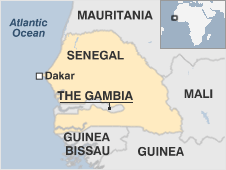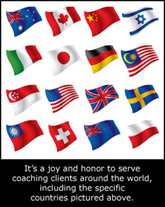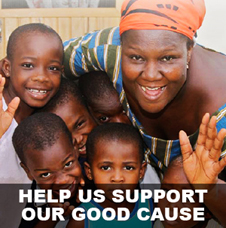 Country profile: Senegal
Country profile: Senegal

In 1990, there were 407 doctors, 200 pharmacists, 58 dentists, 474 midwives, and 562 nurses. As of 1999, there were an estimated 0.1 physicians and 0.4 hospital beds per 1,000 people. As of 2000, 78% of the total population had access to safe drinking water and 70% had adequate sanitation. As of 1999, total health care expenditure was estimated at 4.5% of GDP.
Major health problems include measles and meningitis along with such water-related diseases as malaria, trypanosomiasis, onchocerciasis, and schistosomiasis. There were approximately 258 cases of tuberculosis per 100,000 people in 1999. Malnutrition was prevalent in 23% of all children under age five as of 2000. Goiter was present in 41 of 100 school-age children in 1996. At the end of 2001, the number of people living with HIV/AIDS was estimated at 27,000 (including 0.5% of the adult population) and deaths from AIDS that year were estimated at 2,500. HIV prevalence in 1999 was 1.8 per 100 adults.
Overview
For the Senegalese, political participation and peaceful leadership changes are not new. Even as a colony Senegal had representatives in the French parliament. And the promoter of African culture, Leopold Senghor, who became president at independence in 1960, voluntarily handed over power to Abdou Diouf in 1980.
 |
AT-A-GLANCE
Politics: Abdoulaye Wade came to power in 2000, ending four decades of Socialist Party rule; he won a second term in February 2007
Economy: Agriculture drives the economy; tourism is a source of foreign exchange
International: Senegal has mediated between Sudan and Chad over Darfur tensions; many African illegal migrants use Senegal as a departure point for Europe
Security: Despite a peace deal, a low-level separatist rebellion simmers in Casamance, in the south
|
The 40-year rule of Senegal's Socialist Party came to a peaceful end in elections in 2000, which were hailed as a rare democratic power transfer on a continent plagued by coups, conflict and election fraud.
Senegal is on the western-most part of the bulge of Africa and includes desert in the north and a moist, tropical south. Slaves, ivory and gold were exported from the coast during the 17th and 18th centuries and now the economy is based mainly on agriculture. The money sent home by Senegalese living abroad is a key source of revenue.
A long-running, low-level separatist war in the southern Casamance region has claimed hundreds of lives. The conflict broke out over claims by the region's people that they were being marginalised by the Wolof, Senegal's main ethnic group.
The government and rebels signed a peace pact at the end of 2004, raising hopes for reconciliation.
On the world stage, Senegal has sent peacekeeping troops to DR Congo, Liberia and Kosovo.
Facts
- Full name: Republic of Senegal
- Population: 12.5 million (UN, 2009)
- Capital: Dakar
- Area: 196,722 sq km (75,955 sq miles)
- Major language: French (official), Wolof
- Major religion: Islam
- Life expectancy: 54 years (men), 57 years (women) (UN)
- Monetary unit: 1 CFA (Communaute Financiere Africaine) franc = 100 centimes
- Main exports: Fish, peanuts, petroleum products, phosphates, cotton
- GNI per capita: US $970 (World Bank, 2008)
- Internet domain: .sn
- International dialling code: +221
Leaders
President: Abdoulaye Wade
Abdoulaye Wade, the founder of the Senegalese Democratic Party, won re-election in February 2007, gaining nearly 56% of the votes cast - enough to avoid a second-round ballot.
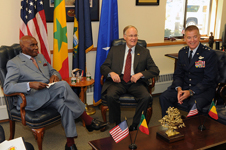
President Abdoulaye Wade, an advocate of democracy in Africa
|
After election officials confirmed his win, Mr Wade warned that corruption cases involving his opponents would be re-opened. The opposition Socialist Party said it would challenge the result.
Mr Wade came to power in March 2000, winning presidential elections at the fifth attempt and defeating Abdou Diouf's Socialist Party. He was 73 at the time.
He found himself in a political impasse: The presidential poll did not coincide with parliamentary elections and he was left heading a minority coalition.
But elections in April 2001 consolidated his power base. His supporters gained control of the national assembly, with his party winning 89 of the 120 seats.
An advocate of democratisation, Mr Wade helped to launch the New Partnership for Africa's Development, or Nepad. The plan aims to foster economic recovery through African-led reforms and good governance. He has sought to strengthen ties with the US.
His critics say he has failed to deliver on promises to boost living standards.
Abdoulaye Wade was born in northern Senegal in 1927. He studied in France and has a French wife.
Senegal has a lively political scene, with parties competing across ethnic, religious and ideological lines.
Media
Senegal has traditionally enjoyed one of the most unrestricted press climates in the region.
But in summer 2008, amid rising tension between the government and private media, Paris-based Reporters Without Borders expressed concern about "police violence" against journalists, and about raids on newspaper offices. The government accused journalists of supporting the opposition.
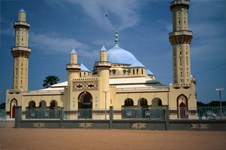
Radio is an influential medium
|
The constitution guarantees media freedom. The government does not practise censorship, but self-censorship arises from laws which prohibit reports that discredit the state, incite disorder or disseminate "false news". Nevertheless, the private media frequently criticise the government.
Radio is an influential medium. Commercial and community stations have mushroomed since the 1990s.
There are nearly 20 daily newspapers. Foreign publications
circulate freely and multichannel pay TV is readily available. BBC World Service (105.6 MHz) and Radio France Internationale are available on FM in Dakar.
Capital: Dakar
Area [sq. km]: 196190
Currency: 1 US Dollar = 473.745 CFA Franc (XOF)
Religions: Muslim, Christian, indigenous beliefs
Population: 13711597
Languages: French, English, Wolof
Health Risks: Bacterial and Protozoal Diarrhea, Hepatitis A and Typhoid Fever. Dengue Fever, Malaria, Yellow Fever Crimean-Congo hemorrhagic fever, and Rift Valley fever are high risks in some locations.
The press
Television
Radio
- Radiodiffusion Television Senegalaise (RTS) - state-run national broadcaster, operates Chaine Nationale and Chaine Internationale networks, the capital's Dakar FM, and several regional services
- Sud FM - private, available in Dakar and other cities
- Nostalgie - Dakar-based private station
- Sept FM - private, Dakar station operated by Groupe Com 7
- Walf FM - private, operated by Groupe Wal Fadjri
- Radio Dunyaa - private
- Radio Future Medias (RFM) - private
News agency

AFRICA | ASIA-PACIFIC | AMERICAS | EUROPE | MIDDLEEAST | SOUTHASIA



Mauritania Mauritius Morocco Mozambique Namibia Niger Nigeria Republic-of-congo Rwanda Sao-tome-and-principe Senegal Seychelles Sierra-leone Somalia South-africa Sudan Swaziland Tanzania The-gambia Togo Tunisia Uganda Australia Brunei Burma Cambodia China East-timor Fiji Indonesia Japan Kazakhstan Kiribati Kyrgyzstan Laos Malaysia Marshall-islands Micronesia Mongolia Nauru New-zealand North-korea Palau Papua-new-guinea Samoa Singapore Solomon-islands South-korea Taiwan Tajikistan Thailand The-philippines Tonga Turkmenistan Tuvalu Uzbekistan Vanuatu Vietnam Antigua-and-barbuda Belize Bolivia Brazil Canada Chile Colombia Costa-rica Cuba Dominica Dominican-republic Ecuador El-salvador Grenada Guatemala Guyana Haiti Honduras Jamaica Mexico Nicaragua St-kitts-and-nevis St-lucia Suriname Trinidad-and-tobago Uruguay Venezuela Albania Andorra Armenia Austria Azerbaijan Belarus Belgium Bosnia-hercegovina Bulgaria Croatia Cyprus Czech-republic Denmark Estonia Finland France Georgia Germany Greece Hungary Iceland Ireland Italy Latvia Liechtenstein Lithuania Luxembourg Macedonia Malta Moldova Monaco Montenegro Norway Poland Portugal Russia San-marino Serbia Slovakia Slovenia Spain Sweden Algeria Egypt Iran Iraq Israel-and-palestinian-territories Jordan Kuwait Lebanon Libya Mauritania Oman Saudi-arabia Sudan Syria Tunisia United-arab-emirates Yemen Afghanistan Bangladesh Bhutan India Nepal Pakistan Sri-Lanka The-Maldive

